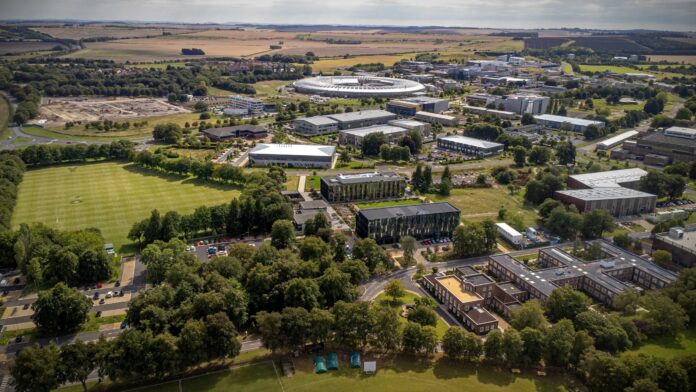So private 5G has made the national news in the UK. Except that’s not the news. The news, and mainstream coverage, is that mobile operator Vodafone has been appointed by Oxfordshire County Council in the UK to deploy and manage a private 5G network at Harwell Science and Innovation Campus, near Didcot in Oxfordshire. The project is funded by the UK government’s Department of Science, Innovation and Technology.
Vodafone, which ranked top of a recent review of private 5G suppliers (and also nowhere in another one), won the deal after a “competitive procurement process”, said the council. Work will begin on the project in the coming weeks, it said. The council ran the tender on behalf of England’s Connected Heartland (ECH), a government-sponsored 5G Innovation Region which covers Oxfordshire, Buckinghamshire, Berkshire, Bedfordshire (central), and Cambridgeshire.
Originally an RAF base, the campus at Harwell is 700 acres, and a home for 240-odd public and private sector organisations, employing about 6,000 people. Tenants include quantum computing specialists (such as National Quantum Computing Centre), space cluster groups (such as the European Space Agency) and life sciences and health-tech organisations (such as UK Health Security Agency, previously Public Health England), among others.
The scope of the new private 5G project is broad; the brief is to “improve daily life for everyone, from improved tele-medicine and remote surgery, more efficient public transport, cleaner cities, smarter farming equipment and an enhanced mobile experience”. A statement said the new infrastructure will deliver a range of applications and services – “from faster quantum leaps to… more comprehensive data sets for research, and real-time comms and control of instruments”.
It is pitched squarely as an Industry 4.0 exercise – to “benefit [the] advanced manufacturing industry”. The statement lists likely applications as asset tracking, drone detection, machine-to-machine connectivity, condition monitoring, and augmented and virtual reality, among others. It is unclear whether Vodafone will use a local tranche of its own 5G spectrum, or annex a part of the UK government’s innovation band, reserved for enterprises at 3.8-4.2 GHz.
Liz Leffman, leader at Oxfordshire County Council, said: “With Vodafone supporting the new 5G digital infrastructure, we’re poised to explore the untapped potential on this exciting technology at Harwell, helping some of the most innovative businesses in the UK, based on the campus, to continue to thrive.”
Claire Harris, head of SME business at Vodafone in the UK, said: “We’re delighted to partner with Oxfordshire County Council on this project. This initiative will not only boost efficiency and productivity but also foster the development of new use cases. The enhanced connectivity will empower businesses and research institutions to thrive, driving UK economic growth and technological advancement.”
Barbara Ghinello, director of innovation clusters at UKRI-STFC, said: “The private 5G network will empower our diverse research and development community. Harwell, as the first science and innovation campus project in the ECH programme, is an ideal fit for this pioneering project. I am particularly excited that this project can serve as a framework for implementing 5G at other science parks across the ECH region, benefitting UK industry.”

